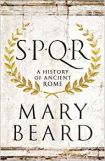SPQR A History of Ancient Rome by Mary Beard
How do we know what really happened at any moment in history? At best we make educated guesses based on (often conflicting) evidence. The most striking aspect of Mary Beard's new examination of Roman history is how far she goes to see all sides and all possible explanations of events. For example, were the emperors Nero and Caligula mad or simply the victims of their successors' smear campaign? What's behind all that nonsense about the city of Rome being founded by twin boys suckled by wolves? This is a book that explodes some of the myths and presents alternative answers. Mary Beard analyses the evidence to shed new light on how a small community grew to become an empire. Military force was important, but other threads in the weave (such as social mobility and the effect of extending citizenship to many of the conquered) made the Roman experience unique.
| SPQR A History of Ancient Rome by Mary Beard | |
|
| |
| Category: History | |
| Reviewer: Madeline Wheatley | |
| Summary: SPQR is the well-known stand-in for the phrase Senatus PopulusQue Romanus, the Senate and the People of Rome. The Roman people are brought vividly to life in this engaging volume. Prominent classicist and media personality, Mary Beard, specializes in unpicking elements of truth from myth in ancient history. In SPQR she painstakingly assembles a balanced view of the civilization that dominated classical antiquity and that still resonates in our lives today. If you only ever read one book on the Romans, make it this one. | |
| Buy? Yes | Borrow? Yes |
| Pages: 544 | Date: October 2015 |
| Publisher: Profile Books | |
| External links: Author's website | |
| ISBN: 9781846683800 | |
|
| |
While the main focus of the book is on politics and power struggles, there are also chapters dealing with the lives of ordinary people. The day to day concerns of the have-nots, the women and children in Roman society are harder to examine as they are less well documented. Archaeological finds and other source material are used to extract glimpses of the concerns of those who were not emperors or senators. The Oracles of Astrampsychus, which is described as an off the peg fortune-telling kit, is one such source. It lists questions and answers covering the most likely things that might be asked of a fortune teller. What it reveals is people whose concerns often mirror our own (health, work, relationships and family), while highlighting issues which hopefully do not (have I been poisoned? will I be freed? will I be sold?). Throwaway comments throughout the book reveal the harshness of life for many. As part of a discussion on the legal process, Beard notes that in both Ancient Greece and Rome, slaves were allowed to give legal evidence only under torture. While a paragraph on reasons for adoption includes the fact that if anyone just wanted a baby, they could easily find one on a rubbish heap, referring to the common practice of exposing an unwanted child soon after birth.
The time span covered by the book takes Rome from its inauspicious beginnings as a not particularly well-favoured settlement through growth to an extensive empire. The broader picture is regularly humanised by honing in on individuals and looking at their life in detail. Augustus, Cicero and Pliny the Younger receive particular attention and help to illustrate key periods in the development from republic to empire. Given the extensive use of source material needed to support the scale of the book, some readers may be disappointed at the lack of a full bibliography. There is a detailed chapter by chapter further reading section, but this will not necessarily help anyone wanting to trace a specific quote as not all references are listed. That said, the enthusiasm, knowledge and understanding of the Roman world that enlivens this book make it a treat to read.
In addition to the further reading section in the book, you might like to try The Ruin of the Roman Empire by James J O'Donnell and Pompeii: The Life of a Roman Town by Mary Beard. You might also enjoy 24 Hours in Ancient Rome by Philip Matyszak. You might also enjoy Ancient Worlds by Michael Scott and for fiction, you could try Caligula by Douglas Jackson.
 SPQR A History of Ancient Rome by Mary Beard is in the Top Ten History Books 2015.
SPQR A History of Ancient Rome by Mary Beard is in the Top Ten History Books 2015.
Please share on: ![]() Facebook,
Facebook, ![]() Twitter and
Twitter and
![]() Instagram
Instagram
![]() You can read more book reviews or buy SPQR A History of Ancient Rome by Mary Beard at Amazon.co.uk Amazon currently charges £2.99 for standard delivery for orders under £20, over which delivery is free.
You can read more book reviews or buy SPQR A History of Ancient Rome by Mary Beard at Amazon.co.uk Amazon currently charges £2.99 for standard delivery for orders under £20, over which delivery is free.
![]() You can read more book reviews or buy SPQR A History of Ancient Rome by Mary Beard at Amazon.com.
You can read more book reviews or buy SPQR A History of Ancient Rome by Mary Beard at Amazon.com.
Comments
Like to comment on this review?
Just send us an email and we'll put the best up on the site.

